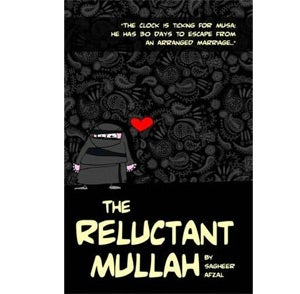The Reluctant Mullah, By Sagheer Afzal
A British Muslim seeks love

Your support helps us to tell the story
From reproductive rights to climate change to Big Tech, The Independent is on the ground when the story is developing. Whether it's investigating the financials of Elon Musk's pro-Trump PAC or producing our latest documentary, 'The A Word', which shines a light on the American women fighting for reproductive rights, we know how important it is to parse out the facts from the messaging.
At such a critical moment in US history, we need reporters on the ground. Your donation allows us to keep sending journalists to speak to both sides of the story.
The Independent is trusted by Americans across the entire political spectrum. And unlike many other quality news outlets, we choose not to lock Americans out of our reporting and analysis with paywalls. We believe quality journalism should be available to everyone, paid for by those who can afford it.
Your support makes all the difference.Musa is an embryonic mullah in a British madrasah with a future of faithful study mapped out for him until he is booted out for dressing up as a (hijabi) woman; the next step, according to his parents, is an arranged marriage, post haste, to a cousin from their Pakistani hometown.
Musa cannot accept this and decides to take his future into his own hands; thus begins this charming, tragi-comic debut novel. Musa cuts a deal with his grandfather (Dadaji) who gives him 30 days to find a wife, or commit himself to the suitable girl reserved for him.
As well as being a comic romance, there are gritty elements in Afzal's world, with drugs and criminality running parallel to the upstanding Pakistani community. Characters grapple with identities that are at odds with each other as Muslims and Britons; some struggle with guilty secrets and double lives.
The portrayal of female sensibilities is nuanced: some stories are told from under a headscarf, while Musa's feisty sister, Shabnam, explores a more western way of life.
The struggles between passion and respectability, and the duty towards oneself versus family responsibility, figure large. Afzal is adept, too, at addressing wider themes of British Muslim identity – often through the religious debates taking place among the men's and women's groups in the local mosque.
The debates are comic, but have a serious, studious side. One worshipper says: "One thing about 9/11 that pissed me off was all these guys telling me I should start praying regular. Now that is a personal thing... I'm a Muslim at heart," and in another confrontation asks: "If you hate being here so much, why haven't you left?"... "9/11 didn't weaken our faith at all because our faith was already weakened by Muslim fighting Muslim..."
In the end, though, Musa must realise that faith is no substitute for lived experience. As Dadaji tells him: "Reading the Holy Quran and learning the sayings of the prophet... does not make you wiser than anybody else. Wisdom is on the other side of pain, not on the other side of a page."
Join our commenting forum
Join thought-provoking conversations, follow other Independent readers and see their replies
Comments